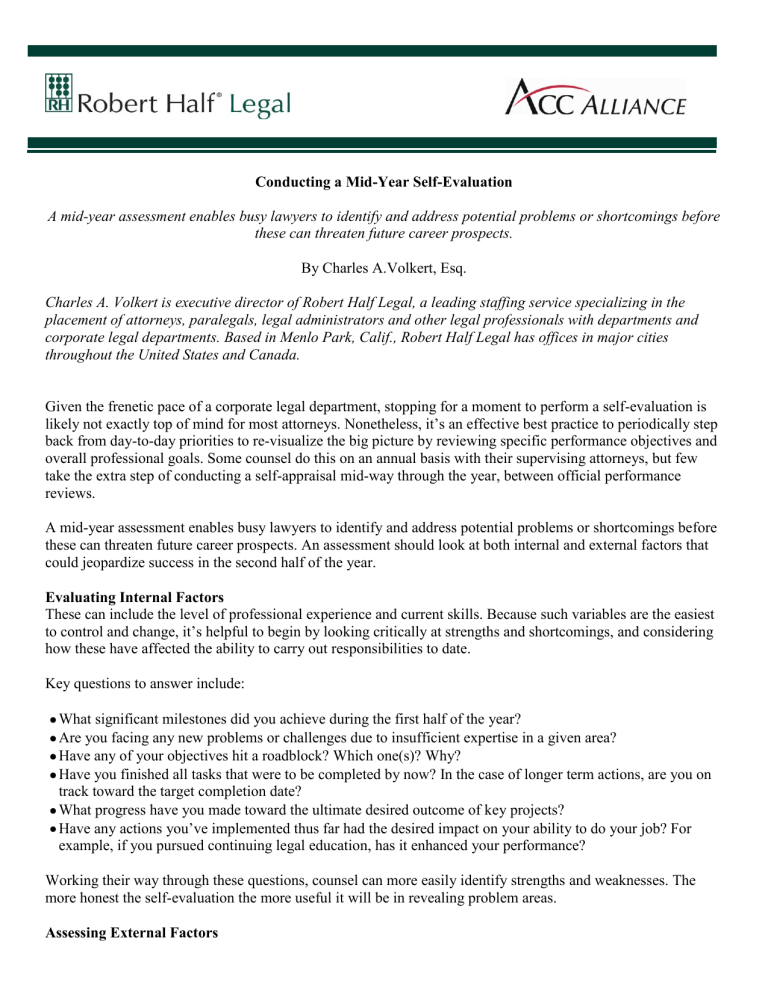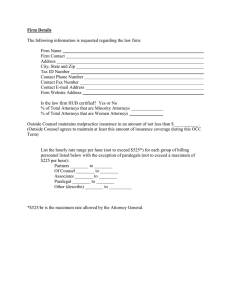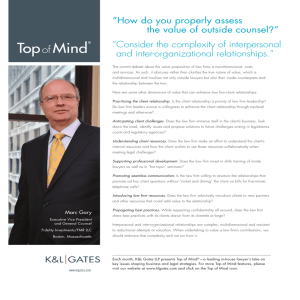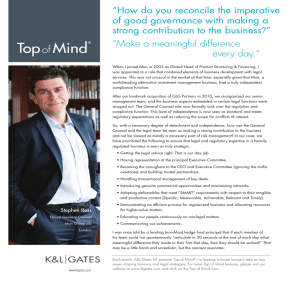Conducting a Mid-Year Self-Evaluation A mid

Conducting a Mid-Year Self-Evaluation
A mid-year assessment enables busy lawyers to identify and address potential problems or shortcomings before these can threaten future career prospects.
By Charles A.Volkert, Esq.
Charles A. Volkert is executive director of Robert Half Legal, a leading staffing service specializing in the placement of attorneys, paralegals, legal administrators and other legal professionals with departments and corporate legal departments. Based in Menlo Park, Calif., Robert Half Legal has offices in major cities throughout the United States and Canada.
Given the frenetic pace of a corporate legal department, stopping for a moment to perform a self-evaluation is likely not exactly top of mind for most attorneys. Nonetheless, it’s an effective best practice to periodically step back from day-to-day priorities to re-visualize the big picture by reviewing specific performance objectives and overall professional goals. Some counsel do this on an annual basis with their supervising attorneys, but few take the extra step of conducting a self-appraisal mid-way through the year, between official performance reviews.
A mid-year assessment enables busy lawyers to identify and address potential problems or shortcomings before these can threaten future career prospects. An assessment should look at both internal and external factors that could jeopardize success in the second half of the year.
Evaluating Internal Factors
These can include the level of professional experience and current skills. Because such variables are the easiest to control and change, it’s helpful to begin by looking critically at strengths and shortcomings, and considering how these have affected the ability to carry out responsibilities to date.
Key questions to answer include:
What significant milestones did you achieve during the first half of the year?
Are you facing any new problems or challenges due to insufficient expertise in a given area?
Have any of your objectives hit a roadblock? Which one(s)? Why?
Have you finished all tasks that were to be completed by now? In the case of longer term actions, are you on track toward the target completion date?
What progress have you made toward the ultimate desired outcome of key projects?
Have any actions you’ve implemented thus far had the desired impact on your ability to do your job? For example, if you pursued continuing legal education, has it enhanced your performance?
Working their way through these questions, counsel can more easily identify strengths and weaknesses. The more honest the self-evaluation the more useful it will be in revealing problem areas.
Assessing External Factors
The degree to which internal factors will positively or negatively influence performance often depend on external factors in the department. Some important external factors that can affect day-to-day functioning include turnover, restructuring of the company or department, expansion into new locations, a merger with another company, or changes in priorities, policies and procedures.
Questions to ask regarding external factors include:
Have events within the department or firm caused the scope of your role to change to such a degree that you feel overwhelmed or inadequately prepared to handle new responsibilities?
Have your support requirements changed? For example, if you are managing a legal project team, do you have sufficient resources to complete the matter on time? If not, how do you need to respond?
Does your department provide reimbursement or time off for the continuing legal education or training you need to close skills gaps or move toward your career goals?
When the mid-year assessment is complete, counsel may want to meet with their supervising attorneys to create an updated action plan for the second half of the year. Although lawyers will want to set ambitious goals that demonstrate their desire to make ever greater contributions, they should remember that they will be held accountable for these next year.
Proposed goals should encourage counsel to stretch their talents but also be achievable. When it comes to discussing areas that need improvement, lawyers should avoid blaming external factors for any difficulties they may be having. It’s better to instead emphasize a desire to build additional legal expertise or gain experience in new areas in order to increase value to the department. This will demonstrate to a supervising attorney that counsel are conscientious, dedicated professionals. With their self-assessment as a guide, corporate attorneys can gain helpful feedback and begin to put in place action items that can make them successful for the rest of the year—and beyond.
Association of Corporate Counsel, ©2009, Washington, DC, 202-293-4103, www.acc.com
Robert Half Legal, 2884 Sand Hill Road, Menlo Park, CA 94025, 1-800-870-8367, www.roberthalflegal.com
Robert Half Legal is an Equal Opportunity Employer
RHL-1107



